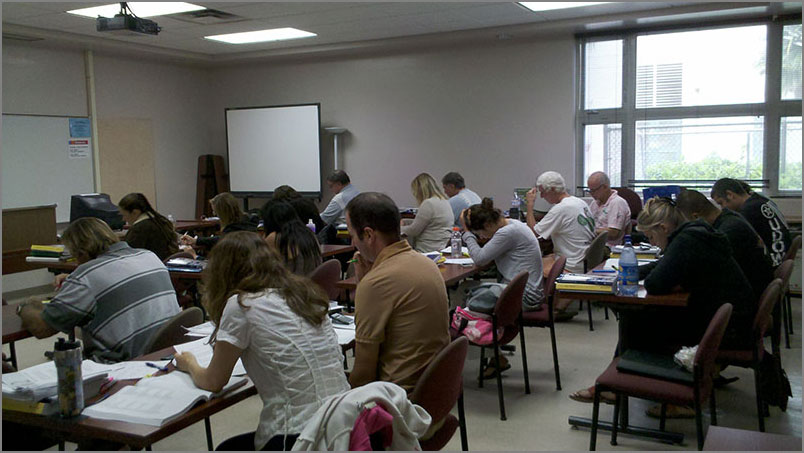What You’ll Learn from Real Estate School About Client Management
What Courses Are Available at a Real Estate Institution? A Full Guide for Aspiring Representatives
Hopeful property agents have a varied range naturally available to boost their understanding and abilities. These offerings vary from fundamental courses in realty principles to specialized training in locations like home management and commercial property. Understanding the different academic paths can be important for success. What necessary topics and strategies will these courses cover, and exactly how might they form a representative's job?
Recognizing the Fundamentals: Real Estate Concepts
The structure of realty understanding depends on comprehending its concepts. These concepts include essential principles that govern the purchasing, marketing, and monitoring of residential or commercial properties. Secret subjects include home possession, land use, and the numerous rights connected with ownership. Comprehending the differences between household, business, and industrial residential properties is vital, as each classification has one-of-a-kind market dynamics.
In addition, students find out concerning market evaluation, which involves assessing building values and trends to make informed choices (Real Estate School). Real estate concepts also cover the significance of contracts and the lawful framework that supports realty transactions. Familiarity with financing choices, such as mortgages and lendings, is essential for guiding the monetary facets of genuine estate. Generally, a strong understanding of these concepts gears up ambitious agents with the foundational understanding essential to be successful in the affordable property market, leading the way for more specialized training and licensing

Licensing Needs and Exam Prep Work
Hopeful realty agents have to navigate details licensing demands to practice legitimately in their corresponding states. These requirements normally include finishing an assigned number of hours in pre-licensing education and learning, which covers essential subjects such as genuine estate regulation, values, and residential or commercial property monitoring. Candidates should additionally pass a state examination that examines their knowledge and understanding of these subjects.
Test preparation is vital for success. Many realty schools provide examination prep courses that give method concerns, study guides, and review sessions. These sources aid prospects familiarize themselves with the test style and content. Additionally, signing up with study hall or using online systems can improve learning via collective review and conversation.
When the examination is passed, representatives need to get their license via the state's realty payment, commonly accompanied by background checks and fees. Satisfying these licensing requirements ensures that agents are equipped to serve clients effectively and fairly in the actual estate market.
Specialized Courses: Home Administration
Recognizing the intricacies of residential property management is vital for genuine estate experts looking for to improve their proficiency in this specific field. Home monitoring programs offer agents with beneficial understandings right into the day-to-day procedures of handling household and commercial residential or commercial properties. These courses commonly cover vital subjects such as lessee connections, lease arrangements, and home maintenance.
Additionally, aiming home supervisors find out about monetary administration, consisting of budgeting and rent collection methods, in addition to lawful duties connected to lessee rights and property regulations.
Programs might additionally check out advertising methods for bring in lessees and devices for residential or commercial property administration software program that streamline procedures. By finishing specialized home management courses, property specialists can much better furnish themselves to deal with the obstacles of taking care of buildings properly, inevitably causing improved customer complete satisfaction and company growth. This understanding is important for those intending to succeed in the affordable property market.
Business Real Estate: A Different Perspective
Commercial property operates under unique market characteristics that differentiate it from household homes. Understanding financial investment techniques specific to this industry is important for success, as is recognizing the significance of networking possibilities readily available to specialists. These elements with each other form an all-encompassing technique to traversing the intricacies of business realty.
Special Market Dynamics

Financial Investment Techniques Explained
Numerous financial investment approaches exist within the domain of industrial realty, each customized to fulfill specific monetary objectives and market problems. One usual technique is value-add investing, where investors acquire underperforming residential properties, boost their value through remodellings, and subsequently increase rental earnings. One more technique is core investing, focusing on supported, premium assets in prime places that offer constant capital. In addition, opportunistic investing involves higher risk, targeting homes needing substantial redevelopment or in emerging markets. Property financial investment trusts (REITs) use a more passive method, enabling individuals to buy a varied profile of commercial homes. Finally, crowdfunding systems have arised, enabling little capitalists to engage in larger industrial offers, democratizing access to the commercial property market.
Networking Opportunities Available
In the domain of property investing, building a durable expert network can substantially best site boost opportunities for success. Networking chances abound at property institutions, where ambitious agents can connect with industry specialists, instructors, and fellow students. Workshops, seminars, and visitor talks usually feature skilled agents and brokers that share understandings and experiences, providing important calls. Many institutions likewise facilitate neighborhood meetups and networking events, urging trainees to engage with the more comprehensive realty neighborhood. In addition, on-line systems and forums connected with these programs permit ongoing communication and cooperation. By leveraging these opportunities, students can promote partnerships that might cause mentorship, partnerships, and potential job positionings, inevitably assisting in their expert advancement within the competitive commercial realty industry.

Real Estate Investment Approaches
Realty investment methods vary significantly, incorporating techniques such as rental residential or commercial property financial investments, turning residences, and involving with Realty Financial Investment Counts On (REITs) Each method provides special opportunities and threats that financiers must meticulously consider. Comprehending these choices is important for any person looking to build an effective property profile.
Rental Property Investments
Numerous financiers find rental building financial investments to be a compelling technique for developing riches and producing passive revenue. This strategy involves purchasing business or residential homes to rent to occupants, ensuring a steady cash flow. Successful rental residential property financial investments call for detailed marketing research, assessing home values, and comprehending regional rental need. Financiers usually take advantage of tax obligation advantages, such as depreciation and home loan passion reductions. Furthermore, residential property management abilities are crucial for keeping lessee partnerships and making sure prompt rent collection. Long-lasting appreciation of home worths can additionally boost a financier's profile. Generally, rental residential property have a peek here investments can give a secure resource of income and add to economic security, making them an eye-catching alternative for several in the property market.
Flipping Homes Techniques
Flipping houses has actually emerged as a preferred approach for real estate investors seeking fast returns on their investments. This method involves buying undervalued homes, making necessary improvements, and marketing them at a greater price. Effective home flippers usually perform thorough market research to recognize promising communities and properties with possibility for recognition. They frequently concentrate on aesthetic upgrades, such as kitchen area and bathroom remodels, to improve charm without spending beyond your means - Real Estate School. Furthermore, recognizing financing alternatives and taking care of spending plans are vital for making best use of profits. Time is important in this method, as prolonged restorations can deteriorate revenue margins. Inevitably, turning residences requires a mix of market knowledge, remodelling skills, and financial acumen to be successful in an affordable realty landscape
REITs and Diversification
Although direct home investment can yield high returns, Realty Financial Investment Counts On (REITs) use an engaging alternative that allows financiers to diversify their portfolios without the complexities of managing physical buildings. REITs are firms that possess, run, or finance income-producing property throughout numerous sectors, consisting of property, commercial, and industrial properties. By purchasing REITs, people can obtain direct exposure to realty markets without the requirement for significant resources or straight administration duties. This financial investment automobile also offers liquidity, as shares can be quickly purchased and marketed on stock market. Additionally, REITs often pay returns, offering a routine revenue stream. Overall, integrating REITs into a portfolio can boost diversification and alleviate risks related to typical property financial investments.
Continuing Education and Professional Advancement
As the property market evolves, professionals should take part in continuing education and learning and specialist growth to stay competitive and educated. This recurring understanding is vital for adjusting to changes in laws, innovation, and market trends. Realty schools offer visit this page various courses designed to boost skills and expertise, including advanced settlement methods, residential or commercial property monitoring, and advertising and marketing methods.
Several states require qualified representatives to complete a set number of continuing education hours to maintain their licenses. These programs commonly cover essential subjects such as values, reasonable real estate laws, and threat monitoring.
Additionally, industry workshops and workshops give networking opportunities, permitting representatives to get in touch with peers and market leaders. By taking part in these instructional programs, property specialists can ensure they continue to be proficient and receptive to client requirements, inevitably bring about job growth and success in a vibrant marketplace.
Regularly Asked Inquiries
What Is the Common Period of Property Courses?
The typical duration of realty courses differs, normally ranging from a few weeks to several months. Aspects affecting this duration include course content, distribution technique, and state requirements, influencing ambitious representatives' instructional timelines.
Are Online Courses Available genuine Estate Education?
Yes, various on-line programs are available genuine estate education. These programs provide adaptability and availability, allowing people to learn at their own rate while covering essential subjects needed for obtaining property licenses and expertise.
Just How Much Do Genuine Estate Courses Typically Price?
Real estate training courses usually vary from $200 to $1,500, depending upon the institution and program size. Extra costs for materials, tests, and state licensing might also apply, adding to the general expense of education and learning.
Can I Take Realty Courses Part-Time?
Yes, individuals can take property courses part-time. Numerous instructional institutions use versatile organizing alternatives, permitting ambitious agents to stabilize their researches with various other commitments, making it easily accessible for those with busy way of lives.
What Jobs Can I Pursue After Finishing Realty Courses?

These offerings vary from foundational courses in real estate concepts to specialized training in areas like home management and commercial real estate. Actual estate concepts also cover the relevance of contracts and the lawful structure that supports genuine estate transactions. While many actual estate experts concentrate on household markets, the dynamics of business actual estate present unique obstacles and opportunities that need a different method. Genuine estate financial investment strategies vary significantly, incorporating strategies such as rental residential property financial investments, turning residences, and engaging with Real Estate Financial Investment Trusts (REITs) Direct property investment can generate high returns, Real Estate Investment Trust Funds (REITs) use a compelling alternative that allows investors to diversify their profiles without the complexities of managing physical homes.